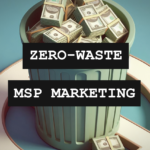What Every IT Newcomer Should Know Before Selling Managed Services
The Managed Services industry is growing. Part of the reason for this is that mid-sized MSPs are finally recruiting sales talent into the industry and taking an active approach to growth. I have recently spent time with several of these industry “newbs” to try to help them through some of the challenges they are facing early in their IT sales career. In doing so, I learned almost as much as they did (if not more) and am extremely optimistic about where our industry is going. To welcome this new brood of Sales Specialists, Business Developers, and Account Managers, I have developed a short list of fundamentals that I think are necessary to having success in selling IT.
Listen More Than You Speak
When a person lacks confidence in their own product/service knowledge, they tend to try to drive the conversation themselves. They do this by flipping the conversation back into the things that they know and are most comfortable with. In IT, this is normally easily recalled product and service features and blanket statements that sound more like website copy than conversation.
If you are new to the industry, this phase is inevitable. It is okay to be inexperienced while you cut your teeth, but understand that you will learn more by listening than you will by speaking. Somewhere in the subconscious of your prospect is the exact button you need to push in order to get them to buy. If you aren’t listening, you will never have a clue what that button is how you go about pushing it. Just remember, you can control a conversation significantly more with a question than you can with an answer.
Solve Your Customer’s Problems
The industry’s emphasis on Monthly Recurring Revenue can create friction and confusion in the sales process. Imagine you are taking your car into an auto repair shop because it is leaking oil, and the Mechanic immediately tries to sell you a Monthly Recurring package that includes remote system monitoring of your engine, reports on performance, roadside assistance, oil changes and tune-ups. While this might be a great service to have, it doesn’t fix your leak and get you back on the road right now. You also have no idea whether or not this mechanic even knows what they are doing and whether or not you can trust them.
To have success in selling IT, you need to always provide a solution to the problems at hand. Focusing too much on the technology and not what problems the technology can solve will make it unclear to the customer that you are the right fit for them. It is also important to not ask for too much too soon. If you are expecting a customer to jump into a long term recurring contract with you before you have proven anything you are likely setting yourself up for disappointment. Always look to build trust over time and prove your value through the sales process.
Know Your Target Audience
At this point, we have probably all gotten LinkedIn DM spam for services that are completely irrelevant to our business, yet the person insists that this is something that we just can’t live without. I understand that casting a wide net is important, but what is even more important is having a deep understanding of who your target is and what they need. This might seem completely obvious, but few really take the time to research and develop a precise audience that is the right fit for their services.
Another aspect of this is understanding that your service isn’t one size fits all. For example, you might find out that a prospect has a fully capable IT Director and has adequately staffed themselves with a Level 1 and 2 support teams. Continuing to try to sell them a Monthly Managed Services contract is probably a waste of time. What you should instead look to do is see if you can get them better pricing on technology services they may already use or wish to use in the future, or offer overflow, after-hours, or project support as they need it. Failing to pivot as you learn more about your customer will chase away valuable leads and leave a bad first impression that is difficult to recover from.

READY TO SELL MORE IT CONTRACTS? GET THE COMPLETE STRATEGY YOU NEED TO MAKE IT HAPPEN.
Manage Customer Expectations
One point of contention between the Sales and Support departments of a Managed Service company is the expectations that are developed during the sales process. Over-promising and under-delivering can put strains on a customer relationship from day one. Whether it is not giving an accurate time line, selling the wrong services, or failing to discover critical pieces of information, all of these things can lead to skewed customer expectations and lose/lose relationships.
If you want to make good with the talented people doing the technical work at your company, you need to have full control of the customer from day one. Be sure to always keep expectations in check, and communicate between departments to make sure that everyone has the information they need. Most importantly, never make assumptions or fail to ask questions, regardless of how it makes you look. Covering up mistakes or lack of knowledge will always come back around one way or another.
Be Authentic To Your Experience
If you don’t have a background in Business Technology and are not an expert, then don’t portray yourself as such. Some newcomers think that they need to position themselves as a “tech guru” in order to get attention and generate new business. While your product and service knowledge is important, don’t feel discouraged if you don’t know your way around a network closet. There is still value that you can bring to your company and its prospects.
Instead try to sell on your strengths. If you can relate to Business Owners in a different way based on your work experience, then this can be a great sales tool even in a technical conversation. There is a ton of value in becoming a “translator” between your company’s Engineers and your prospects. If you become a good liaison to both parties, you can have a long and fruitful career in selling IT. The most important thing is to not get ahead of yourself and try to become something you are not. It can be damaging both you and the company’s reputations.
The Ultimate Guide To Cash Flow For Managed Services
Sponsored by Alternative Payments & Zest
Know When To Walk Away
Not every opportunity is a good opportunity when selling Managed Services. It is important for new sales reps to understand what a good and bad customer looks like and become intentional about who they target. This means learning as much as possible about your existing customers and the relationship your company has with them.
What you will eventually find, is that some new business does more harm than good. This may be because of personality conflicts, over-utilization of services, or failure to adhere to technical best practices. Regardless of the reason, putting your own sales commissions ahead of the long term success of your company may benefit you in the short term, but it won’t last very long. Always look to add high quality customers to your portfolio and your company will love you for it. Try to avoid the low hanging fruit that other MSPs have glanced over. There is probably a reason for it.
Patience is a Virtue
Your final word of wisdom comes by form of Geoffrey Chaucer’s infamous quote, “patience is a virtue.” What you need to understand is that nothing good happens quickly in the Managed Services Industry. The lead generation process is long, the sales cycle is long, the payment cycle is long, and the retention is long. Burning this into your brain and understanding that you can’t view success through a small window will give you the positivity you need to stay on course
If you are 3 months into your employment and you haven’t closed any deals, or seen any commissions it is not completely out of the norm. Make sure that both you and your company share a long view on your success and that you aren’t being held to unfair or unrealistic standards. The industry is growing and is here to stay, so if you want to be a part of it, don’t sacrifice the chance of a 30 year career by making assumptions from a 3 month body of work. Learn your craft, follow the rules, and provide value every way you can. Success will come before you know it.

SPONSORED BY ZEST

















